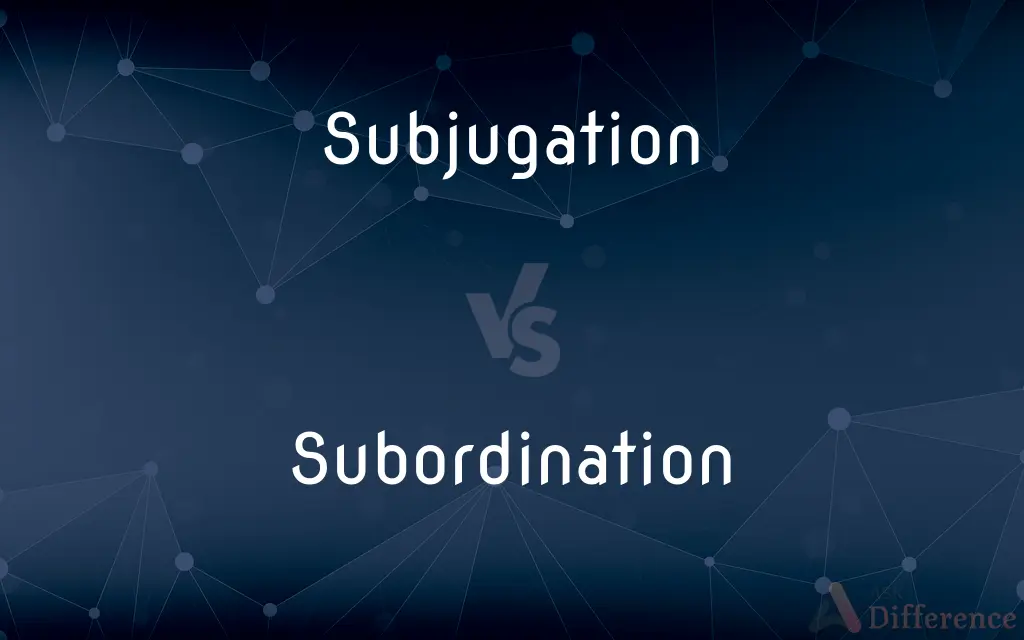Subjugation vs. Subordination — What's the Difference?
By Tayyaba Rehman & Urooj Arif — Updated on April 15, 2024
Subjugation involves forcibly imposing control or authority over someone or something, typically in a comprehensive and oppressive way. Subordination refers to the condition of being lower in rank, status, or importance, within a hierarchical structure.

Difference Between Subjugation and Subordination
Table of Contents
ADVERTISEMENT
Key Differences
Subjugation is a concept that implies taking control over something or someone, often involving force or coercion. It's associated with domination and the suppression of freedom, seen in contexts of conquests or authoritarian governance. On the other hand, subordination is about ranking or positioning in a lower status or order. It can be used in military, social, or organizational contexts to describe hierarchical relationships without necessarily implying oppression or coercion.
Subjugation often entails a clear aggressor and victim, where power is seized by one party over another, frequently through violent or forceful means. This dynamic is seen in historical contexts of colonialism or in authoritarian regimes where the population is kept under control through fear and force. Subordination, while it involves a lower ranking or status, does not inherently involve force. It can be a formalized part of structured systems, like in the military, where ranks dictate the level of authority and responsibility, or in corporations where employees have different levels of seniority and authority.
In the realm of human rights and personal freedoms, subjugation is particularly negative, denoting a violation of people’s rights to self-determination and freedom. It suggests a scenario where individuals or groups are forcibly kept under control, often deprived of their rights and freedoms. Subordination, in contrast, can simply reflect natural or agreed-upon hierarchies that organize social, corporate, or other structures, and it's not inherently negative. It becomes problematic only when it's used to unjustly limit someone’s potential or rights based on arbitrary criteria like gender, race, or socioeconomic status.
Culturally and socially, subjugation has been fought against throughout history, as people strive for equality and autonomy. Movements against colonialism, slavery, and authoritarianism are examples of resistance against subjugation. Subordination, however, is often accepted as part of societal norms and structures, such as in traditional roles within families, organizations, or the military. The key difference is the element of consent and the nature of the hierarchical relationship.
Economically, subjugation can lead to exploitation, where the dominated group is used for the economic gain of the dominator, often without fair compensation or rights. In contrast, subordination in a workplace setting refers to the organizational hierarchy where individuals report to managers above them in the chain of command. While this can lead to issues of workplace inequality or abuse, it is fundamentally different from the economic exploitation seen under subjugation.
ADVERTISEMENT
Comparison Chart
Definition
Exerting control, often by force, to dominate others.
Being ranked lower in a hierarchy without inherent force.
Context
Often seen in oppressive regimes, colonialism.
Found in organizational, social, and military hierarchies.
Implication
Involves aggression, victimization.
Indicates structured hierarchy, not necessarily negative.
Power Dynamics
Imposed by one party over another, often forcefully.
Agreed upon or structured, can be part of a formal system.
Social Perception
Generally viewed negatively as it implies oppression.
Can be neutral or accepted, depending on its justification.
Compare with Definitions
Subjugation
Involves dominating or controlling forcefully.
The subjugation of the population was complete, with strict curfews and surveillance.
Subordination
Can reflect societal norms.
Traditional roles often dictate the subordination of certain groups.
Subjugation
Seen in authoritarian governance.
The dictator’s regime was marked by the subjugation of dissenters.
Subordination
Refers to a lower ranking or status.
His subordination in the company hierarchy limited his decision-making power.
Subjugation
Often associated with conquests and colonization.
The history books detailed the subjugation of indigenous peoples during colonization.
Subordination
Can lead to discussions on equality.
Debates on gender roles often touch on issues of subordination and power dynamics.
Subjugation
Implies a violation of rights and freedoms.
Advocates fight against the subjugation of women in oppressive societies.
Subordination
Integral to structured systems like the military.
Subordination to her superior was a fundamental aspect of military discipline.
Subjugation
Leads to resistance movements.
The subjugation of the nation spurred a widespread resistance movement.
Subordination
Not inherently negative, depends on context.
In the organizational structure, subordination is necessary for efficiency.
Subjugation
To bring under control, especially by military force; conquer.
Subordination
Belonging to a lower or inferior class or rank; secondary.
Subjugation
To make subordinate or subject to the dominion of something else
"The urgency of the mating season is subjugated, for the moment, to the demands of self-preservation" (David M. Carroll).
Subordination
Subject to the authority or control of another.
Subjugation
The act of subjugating.
Subordination
One that is subordinate.
Subjugation
The state of being subjugated; forced control by others.
Subordination
To put in a lower or inferior rank or class.
Subjugation
The act of subjugating, or the state of being subjugated.
Subordination
To make subservient; subdue.
Subjugation
Forced submission to control by others
Subordination
The process of making something subordinate.
Subjugation
The act of subjugating by cruelty;
The tyrant's oppression of the people
Subordination
The process of subordinating.
Subjugation
The act of conquering
Subordination
The property of being subordinate; inferiority of rank or position.
Subordination
The quality of being properly obedient to a superior (as a superior officer).
Subordination
The act of subordinating, placing in a lower order, or subjecting.
Subordination
The quality or state of being subordinate or inferior to an other; inferiority of rank or dignity; subjection.
Natural creature having a local subordination.
Subordination
Place of inferior rank.
Persons who in their several subordinations would be obliged to follow the example of their superiors.
Subordination
The state of being subordinate to something
Subordination
The semantic relation of being subordinate or belonging to a lower rank or class
Subordination
The grammatical relation of a modifying word or phrase to its head
Common Curiosities
Why is subjugation considered negative?
Subjugation is considered negative because it involves the forcible suppression of rights and freedoms, often leading to exploitation and resistance.
What does subordination mean?
Subordination refers to the condition of being lower in rank or position within a hierarchy.
What are the key differences in power dynamics between subjugation and subordination?
Subjugation involves forceful control with clear oppressors and victims, whereas subordination is about a lower ranking within an accepted or formal hierarchy.
Can subordination occur without negative implications?
Yes, subordination can be a normal part of organizational structures and does not necessarily carry negative implications unless it leads to unjust treatment.
What role does consent play in distinguishing subjugation from subordination?
Consent is often lacking in subjugation where control is imposed, whereas subordination usually involves some level of acceptance or formal agreement within a hierarchy.
How does subjugation differ from subordination in a historical context?
Historically, subjugation is associated with conquest and control, such as in colonialism, while subordination is more about structured social or military hierarchies.
Is subordination always formal and agreed upon?
In many contexts, subordination is part of a formal structure, like in companies or the military, but it can also arise in less formal settings through social norms and practices.
How are subjugation and subordination portrayed in literature?
Literature often depicts subjugation as a dramatic struggle for power and freedom, while subordination may be explored in themes of social order and personal identity.
What is subjugation?
Subjugation is the act of dominating or controlling someone or something, often by force.
How do movements against subjugation and subordination differ?
Movements against subjugation typically fight against forceful oppression and violation of rights, while movements against subordination often seek to address inequalities within hierarchical systems.
What are examples of resistance against subjugation?
Examples include revolutions, independence movements, and civil rights struggles against oppressive regimes or colonial powers.
In what scenarios might subordination be beneficial?
Subordination can be beneficial in creating organized, efficient systems, such as in businesses or military operations, where clear hierarchies facilitate function and order.
Can subordination lead to abuse?
While subordination itself is a neutral concept, it can lead to abuse if it perpetuates unjust power dynamics or discrimination.
Does subjugation always involve physical force?
Not always; subjugation can also involve psychological coercion, economic pressure, or social manipulation to control others.
Share Your Discovery

Previous Comparison
Sachet vs. Pouch
Next Comparison
Apogee vs. NadirAuthor Spotlight
Written by
Tayyaba RehmanTayyaba Rehman is a distinguished writer, currently serving as a primary contributor to askdifference.com. As a researcher in semantics and etymology, Tayyaba's passion for the complexity of languages and their distinctions has found a perfect home on the platform. Tayyaba delves into the intricacies of language, distinguishing between commonly confused words and phrases, thereby providing clarity for readers worldwide.
Co-written by
Urooj ArifUrooj is a skilled content writer at Ask Difference, known for her exceptional ability to simplify complex topics into engaging and informative content. With a passion for research and a flair for clear, concise writing, she consistently delivers articles that resonate with our diverse audience.
















































